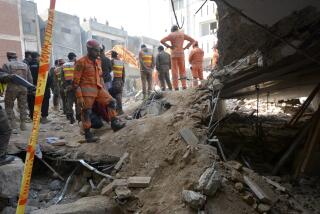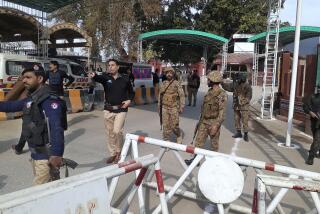At least 28 die in Iraq bombing
- Share via
Reporting from Baghdad — At least 28 worshipers, including a member of parliament, were killed Sunday by a suicide bomber who blew himself up inside Baghdad’s largest Sunni mosque, violence that harked back to the sectarian warfare in Iraq after the 2003 U.S.-led invasion that ousted Saddam Hussein.
No group immediately claimed responsibility for the attack on the Umm al Qura mosque. Sheik Abdul Ghafour Samaraie, head of the Sunni Endowment, which oversees Sunni mosques and is headquartered at Umm al Qura, said he believed the Iraqi affiliate of Al Qaeda was behind the bombing, even though the terrorist group is dominated by Sunni Arabs.
Samaraie was among the 41 people injured in the attack, which killed lawmaker Khalid Fahdawi of the Iraqiya political bloc.
“What hurts me is that the criminal came in as a beggar, he was putting the explosives under bandages,” Samaraie said. “We were thinking that this poor man deserves our help, as he is sick.”
“I finished my lesson to the worshipers, when I came toward him,” he continued. “I was about 4 meters from him [when] he detonated himself.”
Samaraie said that the walls of the mosque were covered with blood and that he saw the dismembered body of a 3-year-old. “Those criminals have nothing to do with religion or humanity,” he said.
The office of Prime Minister Nouri Maliki, a Shiite Muslim, offered condolences and called on the public and security forces to help rid Iraq of remaining terrorists and their collaborators.
During the weekend, at least 13 other people died in a series of attacks in Basra, Fallouja and Baghdad.
As American forces prepare to complete their departure from Iraq at year’s end, the incident provided the latest indicator that security in the country remains uncertain.
“Creating chaos in Iraq is still easy,” said Maysoon Damluji, a spokeswoman for Iraqiya. “We are in need for radical solutions for the security issue.”
In 2006, a bombing attack on the Golden Mosque in Samarra, a Shiite shrine, triggered a period of civil warfare in which thousands died.
Salman is a special correspondent.
More to Read
Sign up for Essential California
The most important California stories and recommendations in your inbox every morning.
You may occasionally receive promotional content from the Los Angeles Times.









